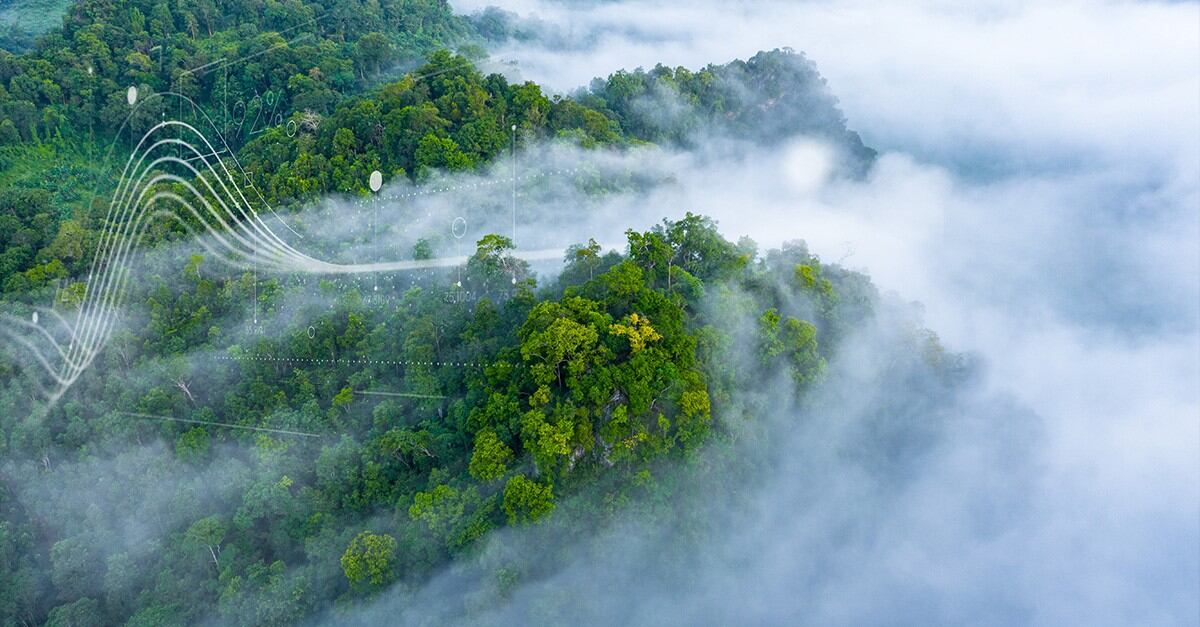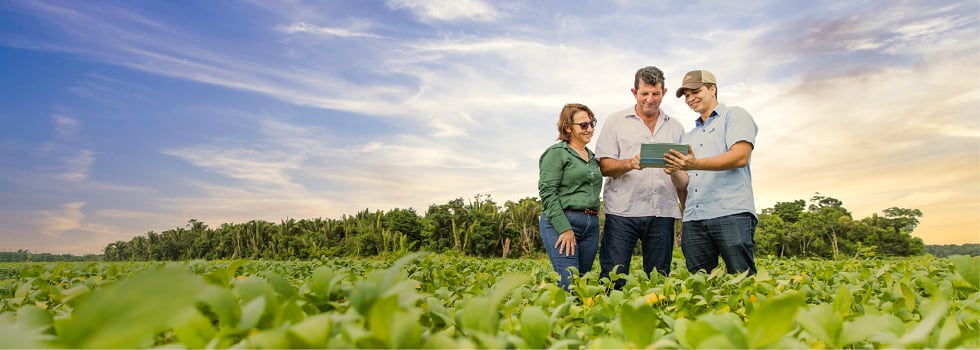The Overstory: Profound stakes for forests – and farmers
Brazil is a land like no other. It is home to the Amazon Rainforest and other environmentally vital tropical landscapes like the Cerrado, a vast biodiverse region of more than 200 million hectares.
Brazil is also poised to become the world’s leading soy producer. The country is under increasing environmental scrutiny, and more than half of its soy crop is sourced from the Cerrado.
As a soy supplier in the region, Cargill is committed to environmentally responsible sourcing and is making significant long-term investments to achieve that goal. Despite a multitude of challenges from stakeholders on all sides of the soy industry, it believes that farmers and forests can coexist in a way that benefits both.
Forests play a critical role in mitigating climate change, reducing erosion and increasing biodiversity. At the same time, soy farming is vital to the survival of thousands of Brazilian soya farmers and to the country’s economy.
Many producers have moved to the Cerrado for more and better farming opportunities as the world’s demand for food has grown. Most are farming land that was cleared many years ago, and they are committed to complying with Brazil’s complex system of environmental laws and regulations.
In this landscape, the stakes are incredibly high – for the planet, the farmers and all Brazilians. The entire soy supply chain has an obligation to protect these vital lands. That includes Cargill.
How Cargill strives for a sustainable soy supply chain
For soy purchased from within Brazil, Cargill estimates the share of its soy grown on land that is deforestation- and conversion-free is 95.68%. As a founding member of the Amazon Soy Moratorium, Cargill does not source soy in the Amazon from land that was cleared after 2008. In addition, its Sustainably Sourced and Supplied (Triple S) certification program offers customers a certified deforestation-free product.
For over a decade, Cargill has been tackling deforestation in its supply chains by focusing its efforts where they are going to have the biggest impact on deforestation – with farmers on the ground.
Cargill also partners with local organizations to develop sustainable agricultural solutions that are economically viable for farmers and their communities. The company believes that any solutions addressing deforestation across the industry must include the stakeholders in the soy supply chain.
Cargill’s cross-sector partnerships with governments, environmental organizations and roundtables – such as the Soft Commodities Forum and Cerrado Working Group – are necessary to achieving lasting systemic change. It collaborates with these, and other stakeholders, across the soy industry to drive innovative solutions, monitor progress and meet certification requirements.
Driving change through vital partnerships: AIBA
One of Cargill’s newest and most significant partnerships is with the Association of Farmers and Irrigators of Bahia (AIBA). It is the largest producer association in the north/northeast area of Brazil, which includes much of the Cerrado.
“The partnership with Cargill strengthens joint actions that encourage compliance with legislation and, simultaneously, expands the adoption of good agricultural practices on a large scale, through innovation and technology transfer, with the premise of increasing productivity and conserving natural resources,” says Alessandra Chaves, director of AIBA sustainability. Chaves emphasizes that the partnership will mean “more opportunities for future generations.”
Together with AIBA and its farmer members, Cargill will jointly develop projects and programs that will help expand sustainability in Western Bahia. This partnership will provide local area farmers with better access to resources, information on sustainable farming methods, and more ways to improve their farm’s social, environmental and economic.
Forest Protection Advisory Panel
Cargill is also responding to environmental concerns through its Forest Protection Advisory Panel. The panel works across priority supply chains to systematically ensure that forest commitments are delivering positive socio-economic and environmental impacts, with input from key global partners and NGOs.
This June, the panel examined a range of impacts, including Cargill’s updated sustainability strategy, the South American soy supply chain and the state of deforestation. It encouraged Cargill to improve sustainability systems during the pandemic, continue to advance transparency and reporting, implement internal incentives for progress on sustainability and commit to collective action across the value chain.

Holding ourselves accountable: Cargill’s Soy Action Plan and $30 million commitment
In 2019, Cargill implemented its South American Soy Action Plan to transform the soy supply chain to be free of deforestation and land conversion. The plan is a pathway to help farmers find alternatives to converting native vegetation.
As Cargill’s sustainability lead for our agriculture supply chain, John Hartmann believes the plan incorporates the company’s high ideals for sustainable farming while also accounting for on-the-ground challenges and conflicting interests.
“We haven’t wavered in our commitment to protecting forests and native vegetation, and we believe this can be done in ways that are economically viable for farmers and local communities,” he explained.
“By working with farmers, customers, governments and others in the industry, we have made meaningful progress on our soy action plan and will continue efforts to make the soy supply chain more sustainable,” says Hartmann.
The actions outlined in the plan are based on three core concepts:
- Complete a comprehensive risk assessment of the soy supply chains’ direct and indirect suppliers.
- Prioritize resources where the company can have the greatest impact.
- Focus on sector-wide transformation to fuel broad, long-term impact and reflect cross-sector needs.
Cargill has made meaningful progress since implementing the plan last year. It transparently shares its risk assessment methodology with suppliers and pledged $30 million to fund and support innovative ideas to protect forests and native vegetation in South America, while taking into account farmers’ interests.
Industry partners are invited to join the fund, which is managed by an internationally trusted fund administrator. Now, Cargill is beginning to attract startups with relevant business models, technology and expertise. They are working to provide the most promising innovators with funding and subject matter expertise to implement their solutions and bring them to scale in Brazil and across South America.
The need for change is urgent. And the prospects for meaningful change – enduring systemic change that protects the Cerrado and other natural landscapes – are gaining momentum.
Points of progress: Steady, measurable impact
As its mid-year progress report shows, in the first half of 2020, Cargill made meaningful progress toward its commitments and in carrying out its Soy Action Plan. The company is more transparent in its business methods and sourcing than ever before and has also improved traceability measures.
Cargill’s milestones include:
- Mapping 100% of its Brazilian supply chain with geo-referenced single points six months ahead of schedule. This mapping technique allows Cargill to more precisely identify the locations of its suppliers and is a critical step toward effectively protecting forests and native vegetation.
- Calculating its estimated share of soy purchased in Brazil grown on deforestation- and conversion-free land: 95.68%. This was accomplished by analyzing externally sourced data about crop growth and changes in land use, using the 2008 Forest Code as a reference point.
- Expanding its direct engagement with farmers in Brazil, including the launch of its new partnership with the Association of Farmers and Irrigators of Bahia (AIBA).
- Growing its Sustainably Sourced and Supplied certification program in Brazil and Paraguay, and expanding the market for soybeans grown through verified sustainable methods. Farmers committed to this program must meet standards for best agricultural practices, worker welfare protections and greenhouse gas emissions.
The challenge ahead is formidable. But Cargill is committed to doing its part to end deforestation in South America.
Visit www.cargill.com/sustainability/supply-chains to learn more about Cargill’s efforts to drive sustainability across its operations.





